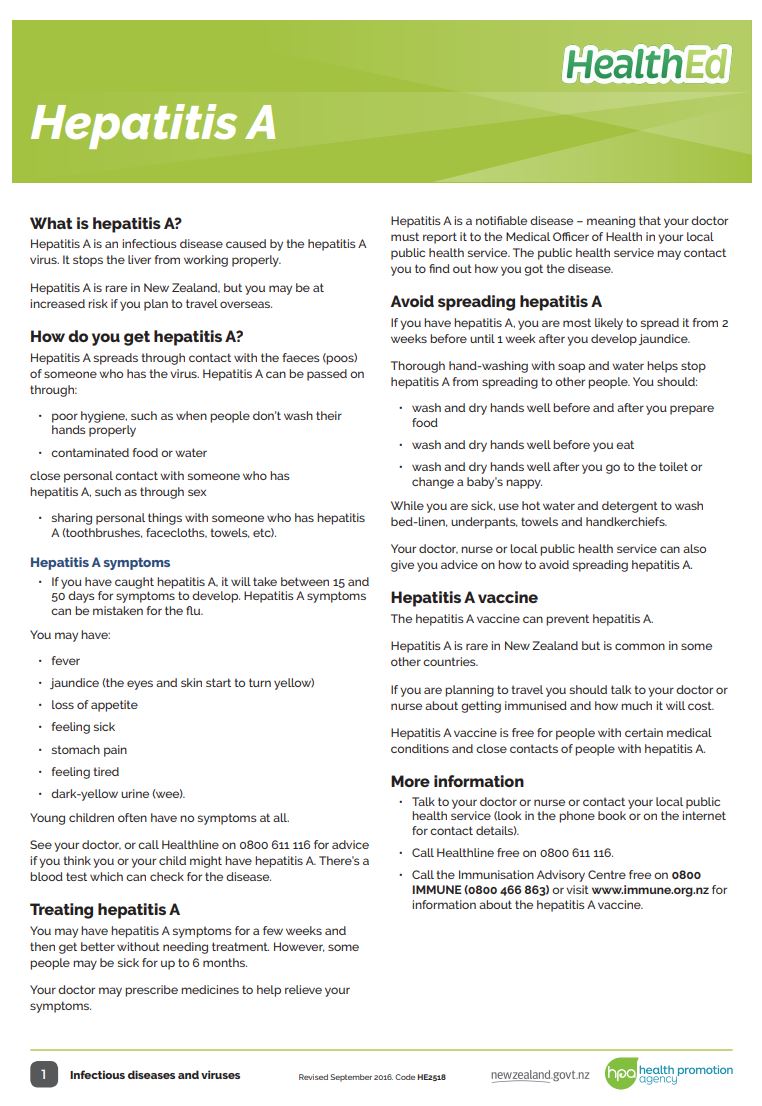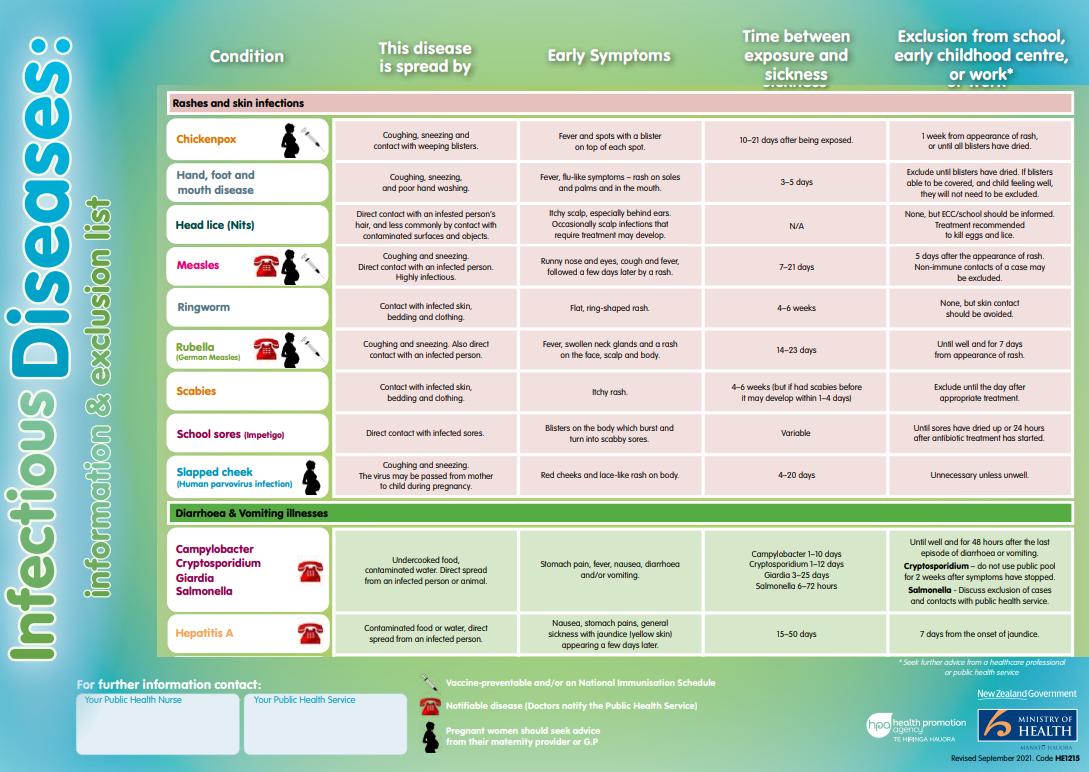- Hepatitis A is usually spread through contact with an infected person's faeces (poo).
- A common cause of infection is poor hand washing with food preparation which can lead to spread via food and water.
- Symptoms include flu-like symptoms and yellowing of your skin and the whites of your eyes (jaundice). Some people have no symptoms at all and serious problems are very rare.
- In most instances the symptoms go away over 1 to 2 weeks (unlike the more serious types of viral hepatitis caused by hepatitis B or hepatitis C).
- There is no specific treatment for hepatitis A infection. For most people, your immune system will fight the virus and heal your liver.
- To reduce the risk of other people becoming infected, anyone with hepatitis infection should stay home and not prepare food for other people for 7 days from the onset of jaundice.
- Good personal hygiene such as washing your hands after going to the toilet helps to prevent spreading the virus to others.
Low or no data? Visit zero.govt.nz, scroll down the page then click on our logo to return to our site and browse for free.
Hepatitis A
Key points about hepatitis A
- Hepatitis A has been in the news lately. It is a virus that causes inflammation of your liver.
- It \'s usually spread through contact with an infected person's faeces (poo).
- A common cause is poor hand washing before preparing kai.
- Symptoms are usually mild and the infection goes away over 1 to 2 weeks (unlike the more serious types of hepatitis, hepatitis B or hepatitis C).
- There's no treatment but you can limit spreading it to others through thorough hand washing and avoiding preparing food for others for at least a week.

The hepatitis A virus is carried in the faeces (poo) of an infected person. You can come into contact with this when you:
- drink contaminated water
- eat food prepared by someone with hepatitis A virus who did not wash their hands well after going to the toilet
- have sexual contact with someone with the virus
- do not wash your hands after toileting.
Hepatitis A is very contagious and people can spread the virus before they feel sick. Only a small amount of virus is needed to spread the infection. The virus can survive on objects and in water for months.
Hepatitis A is rare in New Zealand but can affect anyone who is not immune. Those at higher risk of contracting the infection are:
- people who travel overseas, especially to countries where sanitation is not good
- children and staff in day-care centres
- people in jobs that exposes them to faeces (poo), such as healthcare workers and people who work with sewerage
- sex industry workers
- men who have sex with men
- people who inject illegal drugs
- people who are in close personal contact with an infected person.
Travelling overseas?
Hepatitis A is more common in developing countries, so if you are travelling overseas ask your doctor whether you need hepatitis A vaccination before you leave. Also, find out whether it is safe to drink the tap water and take extra care with all you eat and drink.
When travelling in developing countries, it’s best if you:
- avoid foods you cannot peel or cook
- don’t drink unpackaged drinks or ice
- don’t eat shellfish.
Hepatitis A can cause temporary swelling of your liver, but it rarely causes lasting damage. It usually gets better on its own after several weeks.
Infants and children usually get no symptoms at all. The older you are, the more severe the symptoms of hepatitis A tend to be, and the illness can be more serious in people with chronic liver disease or with weakened immune systems (also called immuno-compromised).
| Symptoms of hepatitis A: | |
|---|---|
|
|
Symptoms can appear from 2 to 7 weeks after you’ve come into contact with the hepatitis A virus and usually only last 1 to 2 weeks. Sometimes, in more severe cases, it can last weeks to months. In very rare cases, it can be life threatening.
You are infectious (can pass infection on to someone else) for 2 weeks before you show any symptoms and for 1 week after you develop jaundice (yellowing of your skin and eyes).
To reduce the risk of other people becoming infected, stay home and don't prepare food for other people for 7 days from the onset of jaundice. After you have recovered from hepatitis A, you are immune and cannot get it again.
To diagnose hepatitis A infection, your doctor:
- will ask you about your symptoms and travel history and check your immunisation status
- will look for noticeable physical signs such as jaundice (yellowing of your skin and eyes)
- may also ask for blood tests, such as liver function tests and hepatitis A antibody tests.
Usually, no specific treatment is needed. In most cases, your immune system will fight the virus and your liver will heal completely. To help your recovery, you may be advised to:
- rest – hepatitis A infection can make you tired, so rest when you feel you need to
- protect your liver – avoid alcohol and review your medication with your doctor.
Very rarely, people become very sick and need to be cared for in hospital.
To reduce the risk of other people becoming infected, anyone with hepatitis A should stay home and not prepare food for other people for 7 days from the onset of jaundice.
Practising good hygiene
Good hygiene is the best way to prevent hepatitis A. Avoid the spread of germs by:
- washing hands before and after preparing food
- washing hands before eating
- washing hands after going to the toilet or changing a baby’s nappy.
Read more about hand hygiene.
Take care with what you eat and drink
- Boil your drinking water if it comes from an untreated source, such as a river.
- High temperatures, such as boiling or cooking food or liquids for at least 1 minute at 85°C, kill the virus, although freezing temperatures do not.
Protect your body from infection
- Avoid contact with other people’s blood.
- Don’t share personal items like razors or injecting gear.
- Practice safe sex by using condoms.
Get vaccinated if you are high risk
There is a vaccine that protects against hepatitis A infection. To get the full benefit of the hepatitis A vaccine, 2 doses of the injection are needed.
- After 1 dose of hepatitis A vaccine, protection from hepatitis A lasts for at least 1 year.
- A second booster dose, given 6 to 12 months after the first dose, gives longer term protection. It is predicted that protection could last for 20 years.
Hepatitis A is uncommon in New Zealand but the vaccine is funded for people at risk of severe infection, such as:
- transplant patients
- children with chronic liver disease
- people who live in close contact with someone infected with hepatitis A.
Vaccination is recommended but not funded for the following groups:
- adults with chronic liver disease, including chronic hepatitis B or chronic hepatitis C
- men who have sex with men
- some occupational groups (eg, healthcare workers exposed to faeces/poos, employees of early childhood services, particularly where there are children too young to be toilet trained, sewage workers, those who work with non-human primates (eg, zoos and research laboratories)
- food handlers during community outbreaks
- military personnel who are likely to be deployed to high-risk areas.
If you are planning to travel to a developing country, you may be at risk of hepatitis A infection and should consider getting vaccinated. The vaccine should be given at least 2 weeks before departure so your body has time to respond to the vaccine.
- High-risk areas include Africa, Asia, Central and South America and the Middle East.
- Moderate-risk areas include the Mediterranean, Eastern Europe (including Russia) and parts of the Pacific.
Read more about the hepatitis A vaccine.
The following links have more information about hepatitis A:
Hepatitis A(external link) Hepatitis Foundation NZ
Hepatitis A(external link) The Immunisation Advisory Centre, NZ
Hepatitis A(external link) Healthy Sex, NZ
Resources
Infectious diseases(external link) Health Ed and Ministry of Health, NZ, 2022
Fact sheet - Hepatitis A (external link)HealthEd, NZ Available in the following languages: Tongan(external link), Samoan(external link)
References
- Hepatitis A(external link) Ministry of Health, NZ, 2018
- Hepatitis A(external link) Immunisation Handbook, NZ, 2020
- Hepatitis A(external link) The Immunisation Advisory Centre, NZ, 2017
- Havrix(external link) The Immunisation Advisory Centre, NZ, 2019
- Hepatitis A vacine(external link) NZ Formulary
Hepatitis A(external link) Communicable Disease Control Manual, Ministry of Health, NZ
Brochures

Health Ed, NZ, 2016

Health Ed and Ministry of Health, NZ, 2022
Credits: Healthify editorial team. Healthify is brought to you by Health Navigator Charitable Trust.
Reviewed by: Lucy Mills, Clinical Nurse Specialist, Middlemore Hospital
Last reviewed:
Page last updated:





